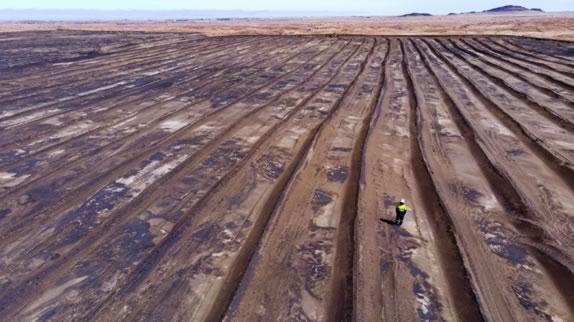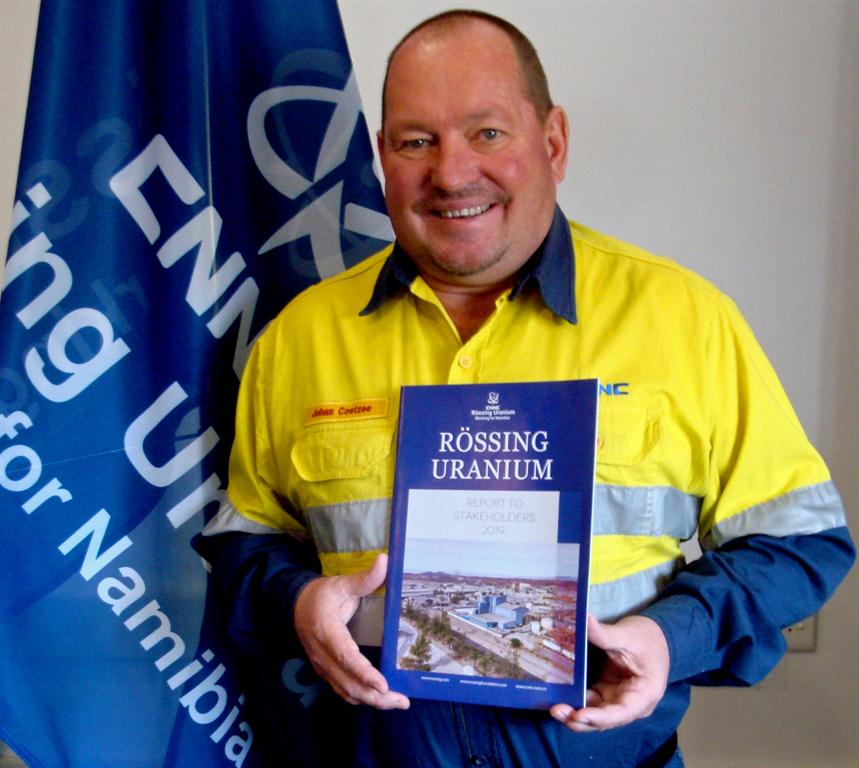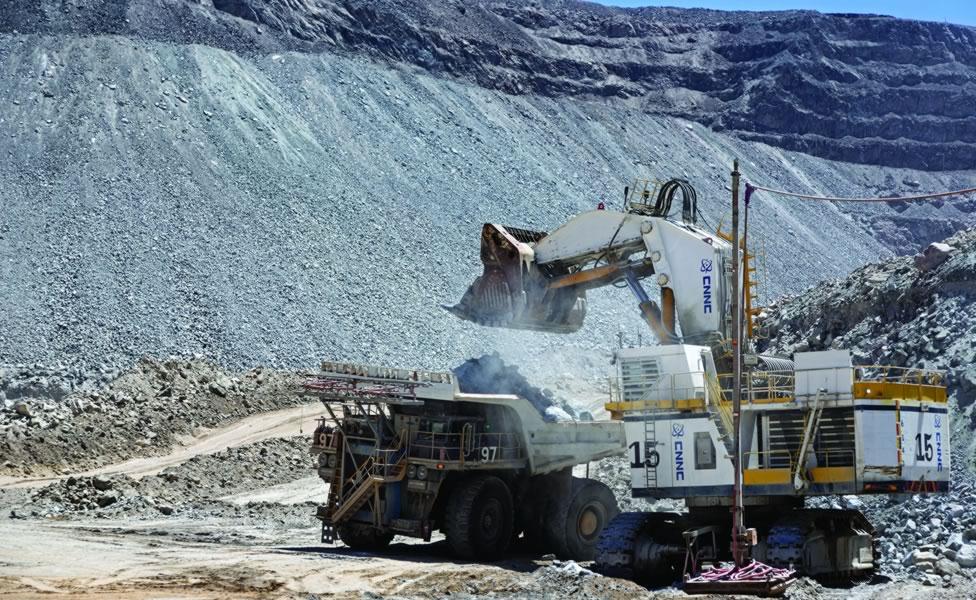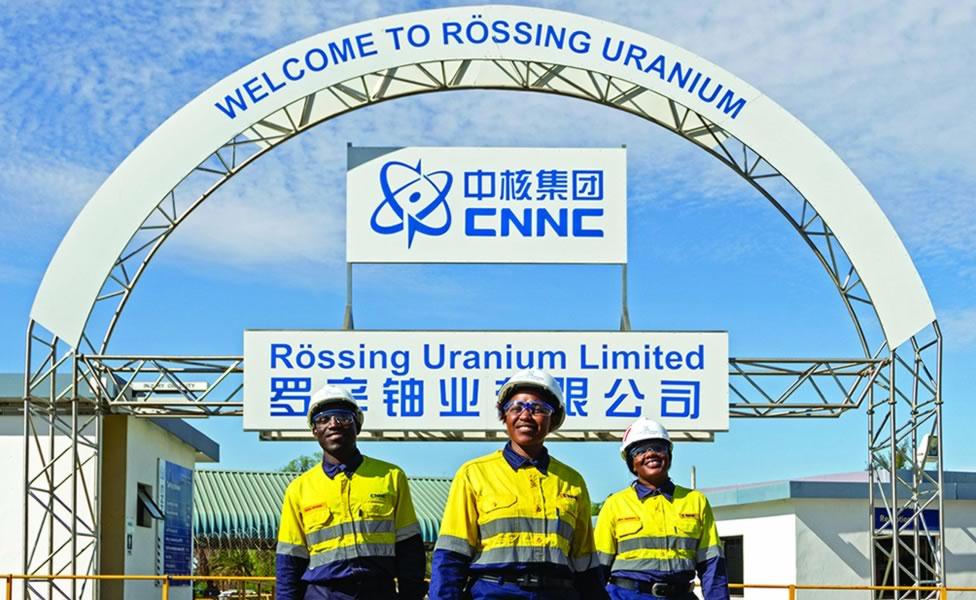Old man Rössing’s bright future
Longest-running uranium mine secures longevity through sale to China.
Augetto Graig - CNNC Rössing Uranium is an iconic Namibian uranium mining corporation which has contributed to the development of the country for almost 44 years. Releasing the stakeholders report for 2019 amid an outbreak of the deadly Covid-19 coronavirus in Namibia, the remarkable mine nevertheless looks to the future as a new era of optimism.
According to managing director Johan Coetzee, “2019 will be remembered as the beginning of an exciting new chapter in Rössing Uranium’s rich history.” Coetzee says that the 25 July 2019 conclusion of the China National Uranium Corporation (CNUC) purchase of 68,62% of Rössing from Rio Tino secured a bright future for the grandfather among uranium mines. In operation since 1976 Rössing is considered the longest-running open-pit uranium mine in the world.
Chinese market
CNUC is a subsidiary of state-owned China National Nuclear Corporation Limited (CNNC), a vertically integrated supplier of nuclear energy into the Chinese and international markets. “Being part of this giant family brings to Rössing Uranium all the benefits of shared cooperation and a solid base from where to build the future of the mine,” says Coetzee.
“In 2019 the company went through many changes, some of these under less-than-favourable operational circumstances, but we achieved a lot,” he maintains. Among these achievements Coetzee lists a total of 22.4 million tonnes of rock was mined, 13% more than in 2018, of which 8.6 million tonnes was economic uranium-bearing ore, 7% more than in 2018, with 13.3 million tonnes of waste and low-grade ore mined. A total of 2 449 tonnes of uranium oxide was produced in 2019, marginally lower when compared with 2018’s production of 2 479 tonnes, whilst ending the year with healthy inventories on site, he said.
More profits
Revenue was in line with 2018 at N$2.82 billion. “Lower sales volumes were largely offset by a more favourable exchange rate,” according to Coetzee. “However, a 15% reduction in operating costs had a positive impact on profits before tax,” he added. The reduced costs largely contributed to an improved net profit after tax from normal operations of N$503 million compare to 2018 profits of N$166 million.
“2020 and the next few years will still be challenging, but with our new majority shareholder we are confident that we will build from a solid base, exploring various opportunities to remain a competitive supplier of uranium into the nuclear energy market,” says Coetzee.
The uranium spot market price in 2019 averaged US$25.91. “In the medium- to long-term uranium prices are expected to recover, but may take another five years. Moderate demand growth and subdued supply will drive a gradual price appreciation. While demand is expected to grow in the long term, the rate of growth remains uncertain,” according to the managing director.
However, 2019 also witnessed a series of positive news events on nuclear development. China, for the first time since 2016, finally re-launched its approval for new projects and construction with at least four reactors having been approved; two at CNNC’s Zhangzhou site and two at CGN’s Huizhou site.
Of the 11% uranium produced by Namibia in 2019, as part the world’s primary production of uranium oxide, Rössing Uranium produced 3.9%. “This is a significant achievement for both Rössing Uranium and Namibia. 75% cent of Rössing’s total production was delivered under long-term contracts and to several historical spot contracts. The remaining production will be sold during 2020 to China, to be loaded into CNNC nuclear reactors. This vertical integration into the CNNC group opens a significant marketing opportunity into China for Rössing Uranium,” he elaborates.
Local relevance
Meanwhile Rössing continues investing in the local economy. “As a major employer and purchaser of goods and services, we make a significant annual contribution to economic development in the Erongo Region, in particular, and to Namibia at large,” says Coetzee.
In 2019, total expenditure for goods and services amounted to N$2.72 billion (2018: N$2,49 billion), of which 75% or N$2.03 billion, was spent with Namibian registered suppliers. The bulk of the Namibian spend was in the Erongo Region (43%) and Khomas Region (44%).
Total procurement from international suppliers amounted to N$373 million, representing 14% of total procurement expenditure, excluding South Africa, where goods and services to the value of N$311 million (11%) of total procurement was spend. Rössing also invested N$26 million in Namibian communities during 2019, directly and through the Rössing Foundation, which is a 100% increase compared with the previous year.
Rössing also prides itself as being an employer of choice. “At Rössing capacity building and development of employees is a critical process aimed at enhancing productivity and organisational performance. Aspiring to be the employer of choice, Rössing Uranium provides long-term and rewarding employment by investing in its people throughout their careers, with 98.7% of the workforce being Namibian and only 1.3% expatriates from other nationalities,” according to Coetzee.
The uranium miner is also a champion of safety. “At Rössing Uranium, safety is the foundation on which the business is build,” says Coetzee. Recognising Rössing’s safety efforts and achievements, Rössing won the Chamber of Mines’ 2019 Best Safety Award in the Operating Mines category for the second consecutive year.
Safety priority
The mine recorded an All Frequency Injuries Rate (AIFR) of 0.49, a significant improvement on the 0.83 AIFR recorded in 2018. It is also the same AIFR recorded in 2012, and the third best since 2004.
“The company remains committed to zero harm and have put rigorous processes and systems in place to ensure that every employee and contractor finishes his or her work day as safely and as healthy as they were when they reported for work,” he insists. Coetzee says that, as part of Rössing’s continuous improvement focus, demanding goals are set for protecting the environment in which the company operates, and conservation measures at the mine are taken seriously, with particular focus on water management and monitoring. “Rössing has a strong history of engagement and cooperation with regulators and other stakeholders to ensure that the environment remains protected,” according to the managing director.
- [email protected]
According to managing director Johan Coetzee, “2019 will be remembered as the beginning of an exciting new chapter in Rössing Uranium’s rich history.” Coetzee says that the 25 July 2019 conclusion of the China National Uranium Corporation (CNUC) purchase of 68,62% of Rössing from Rio Tino secured a bright future for the grandfather among uranium mines. In operation since 1976 Rössing is considered the longest-running open-pit uranium mine in the world.
Chinese market
CNUC is a subsidiary of state-owned China National Nuclear Corporation Limited (CNNC), a vertically integrated supplier of nuclear energy into the Chinese and international markets. “Being part of this giant family brings to Rössing Uranium all the benefits of shared cooperation and a solid base from where to build the future of the mine,” says Coetzee.
“In 2019 the company went through many changes, some of these under less-than-favourable operational circumstances, but we achieved a lot,” he maintains. Among these achievements Coetzee lists a total of 22.4 million tonnes of rock was mined, 13% more than in 2018, of which 8.6 million tonnes was economic uranium-bearing ore, 7% more than in 2018, with 13.3 million tonnes of waste and low-grade ore mined. A total of 2 449 tonnes of uranium oxide was produced in 2019, marginally lower when compared with 2018’s production of 2 479 tonnes, whilst ending the year with healthy inventories on site, he said.
More profits
Revenue was in line with 2018 at N$2.82 billion. “Lower sales volumes were largely offset by a more favourable exchange rate,” according to Coetzee. “However, a 15% reduction in operating costs had a positive impact on profits before tax,” he added. The reduced costs largely contributed to an improved net profit after tax from normal operations of N$503 million compare to 2018 profits of N$166 million.
“2020 and the next few years will still be challenging, but with our new majority shareholder we are confident that we will build from a solid base, exploring various opportunities to remain a competitive supplier of uranium into the nuclear energy market,” says Coetzee.
The uranium spot market price in 2019 averaged US$25.91. “In the medium- to long-term uranium prices are expected to recover, but may take another five years. Moderate demand growth and subdued supply will drive a gradual price appreciation. While demand is expected to grow in the long term, the rate of growth remains uncertain,” according to the managing director.
However, 2019 also witnessed a series of positive news events on nuclear development. China, for the first time since 2016, finally re-launched its approval for new projects and construction with at least four reactors having been approved; two at CNNC’s Zhangzhou site and two at CGN’s Huizhou site.
Of the 11% uranium produced by Namibia in 2019, as part the world’s primary production of uranium oxide, Rössing Uranium produced 3.9%. “This is a significant achievement for both Rössing Uranium and Namibia. 75% cent of Rössing’s total production was delivered under long-term contracts and to several historical spot contracts. The remaining production will be sold during 2020 to China, to be loaded into CNNC nuclear reactors. This vertical integration into the CNNC group opens a significant marketing opportunity into China for Rössing Uranium,” he elaborates.
Local relevance
Meanwhile Rössing continues investing in the local economy. “As a major employer and purchaser of goods and services, we make a significant annual contribution to economic development in the Erongo Region, in particular, and to Namibia at large,” says Coetzee.
In 2019, total expenditure for goods and services amounted to N$2.72 billion (2018: N$2,49 billion), of which 75% or N$2.03 billion, was spent with Namibian registered suppliers. The bulk of the Namibian spend was in the Erongo Region (43%) and Khomas Region (44%).
Total procurement from international suppliers amounted to N$373 million, representing 14% of total procurement expenditure, excluding South Africa, where goods and services to the value of N$311 million (11%) of total procurement was spend. Rössing also invested N$26 million in Namibian communities during 2019, directly and through the Rössing Foundation, which is a 100% increase compared with the previous year.
Rössing also prides itself as being an employer of choice. “At Rössing capacity building and development of employees is a critical process aimed at enhancing productivity and organisational performance. Aspiring to be the employer of choice, Rössing Uranium provides long-term and rewarding employment by investing in its people throughout their careers, with 98.7% of the workforce being Namibian and only 1.3% expatriates from other nationalities,” according to Coetzee.
The uranium miner is also a champion of safety. “At Rössing Uranium, safety is the foundation on which the business is build,” says Coetzee. Recognising Rössing’s safety efforts and achievements, Rössing won the Chamber of Mines’ 2019 Best Safety Award in the Operating Mines category for the second consecutive year.
Safety priority
The mine recorded an All Frequency Injuries Rate (AIFR) of 0.49, a significant improvement on the 0.83 AIFR recorded in 2018. It is also the same AIFR recorded in 2012, and the third best since 2004.
“The company remains committed to zero harm and have put rigorous processes and systems in place to ensure that every employee and contractor finishes his or her work day as safely and as healthy as they were when they reported for work,” he insists. Coetzee says that, as part of Rössing’s continuous improvement focus, demanding goals are set for protecting the environment in which the company operates, and conservation measures at the mine are taken seriously, with particular focus on water management and monitoring. “Rössing has a strong history of engagement and cooperation with regulators and other stakeholders to ensure that the environment remains protected,” according to the managing director.
- [email protected]








Kommentar
Allgemeine Zeitung
Zu diesem Artikel wurden keine Kommentare hinterlassen